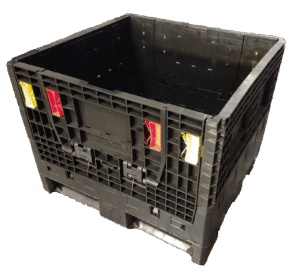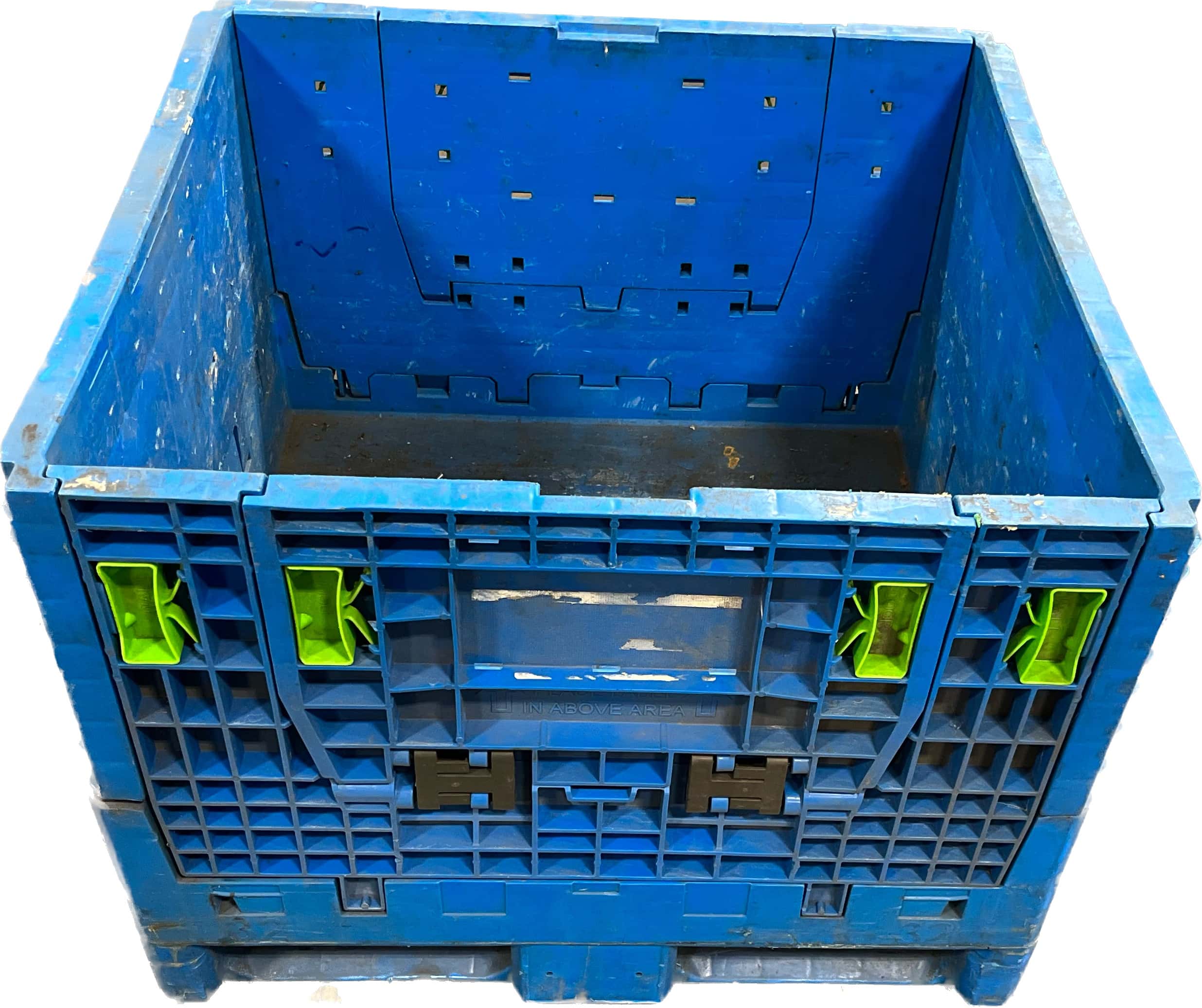Why Bulk Containers Are Important for Economical and lasting Transport
Bulk containers play a necessary role in contemporary logistics. They facilitate the reliable activity of big quantities of items, therefore maximizing transportation procedures. This technique not only minimizes costs however also minimizes ecological effect via reduced discharges and waste generation. As markets look for even more lasting techniques, the fostering of bulk containers is ending up being increasingly significant. What implications does this shift hold for future logistics and supply chain management?

The Advantages of Making Use Of Mass Containers in Logistics
Bulk containers transform logistics by boosting performance and sustainability. These containers permit for the transportation of big quantities of items in a solitary journey, noticeably reducing the variety of journeys needed. This not only streamlines procedures but likewise decreases labor costs related to handling, filling, and discharging. Additionally, mass containers are developed to maximize area usage within transport automobiles, making certain that more items can be delivered at the same time.
The standardization of bulk containers likewise streamlines the logistics process. With uniform dimensions, they can be quickly piled and kept, bring about improved warehouse administration. Mass containers typically include resilient products that safeguard contents from damage throughout transportation, consequently lowering product loss and boosting overall reliability. Because of this, services can experience boosted supply chain performance, ultimately causing increased earnings and client complete satisfaction. This combination of variables makes mass containers a critical asset in modern logistics.
Environmental Effect: Reducing Waste and Carbon Impact
As markets increasingly prioritize sustainability, the adoption of bulk containers has emerged as a vital technique for minimizing waste and lowering carbon footprints. These containers reduce using packaging products, such as boxes and plastic, thereby notably lowering general waste generation. By consolidating deliveries, mass containers boost transport effectiveness, permitting more products to be moved per trip. This decrease in journeys straight correlates with lower greenhouse gas discharges, contributing to a smaller carbon footprint.
Bulk containers can frequently be recycled or recycled, additionally mitigating ecological effect. The longevity of these containers guarantees they can endure several transport cycles, reducing the demand for single-use alternatives. refurbished bulk containers. By simplifying logistics and advertising effective resource use, bulk containers not only support lasting techniques but likewise motivate sectors to line up with worldwide ecological goals. Ultimately, their application shows a commitment to ecological stewardship and accountable resource management
Expense Financial Savings: How Mass Containers Lower Transportation Expenses
While numerous business seek methods to boost their profits, the use of mass containers presents a considerable opportunity for reducing transportation costs. Mass containers optimize the volume of products transferred, permitting companies to ship bigger quantities at the same time. This efficiency reduces the variety of trips called for, directly lowering gas prices and reducing labor expenses related to loading and unloading.
Furthermore, mass containers usually include structured styles that enhance room usage within transport cars. This implies less vacant spaces, bring about much more efficient use available ability. Moreover, the sturdiness of bulk containers can reduce the risk of product damages throughout transit, decreasing losses and guaranteeing that even more goods show up undamaged.
Enhancing Supply Chain Effectiveness With Bulk Storage Space Solutions
Bulk storage options play a necessary function in boosting supply chain effectiveness by optimizing supply administration. By combining items into fewer, larger containers, companies can greatly reduce handling prices connected with regular transfers and handling. This streamlined technique enables better monitoring and administration of inventory, inevitably bring about enhanced functional efficiency.
Structured Stock Management
Effective stock monitoring is important for enhancing supply chain procedures, specifically when organizations adopt bulk storage services. These services make it possible for businesses to preserve greater supply degrees while reducing the frequency of replenishment. By consolidating materials right into mass containers, companies can streamline their stock procedures, reducing the intricacy connected with tracking numerous smaller sized bundles. This method assists in exact stock counts and enhances forecasting precision, permitting for more educated decision-making. Additionally, mass storage space remedies streamline stockroom organization, making it simpler to locate and access products when needed. As a result, organizations can attain a more efficient supply turnover rate, ultimately enhancing overall supply chain efficiency and minimizing the probability of stockouts or overstock circumstances.

Decreased Handling Prices
The application of bulk storage services not only enhances stock administration but likewise considerably decreases taking care of prices throughout the supply chain. By consolidating materials into mass containers, firms lessen the requirement for frequent handling and transfer in between different storage space and transportation units. This approach lowers labor prices connected with loading, dumping, and moving smaller sized packages. In addition, mass storage space minimizes the regularity of deliveries, leading to reduced transport costs and decreased fuel usage. Therefore, businesses can optimize their logistics procedures, permitting a more effective allowance of sources. Ultimately, minimized dealing with costs add to improved general supply chain efficiency, cultivating an atmosphere that supports both sustainability and financial viability.

Versatility of Mass Containers Throughout Different Industries
Although several industries have distinct requirements for transport and storage, bulk containers have become a functional remedy that satisfies a wide range of requirements. These containers, ranging from huge bins to specialized storage tanks, can accommodate varied materials, including powders, fluids, and granules. In the farming field, bulk containers assist in the transport of fertilizers and grains, while the food and beverage sector utilizes them for components and ended up products. The chemical industry relies on bulk containers for securely transferring harmful products, ensuring conformity with safety and security policies. Additionally, construction firms benefit from bulk containers for carrying aggregates and other materials. Their versatility includes various modes of transport, consisting of trucks, ships, and trains, improving logistical performance. This adaptability not just streamlines operations throughout different fields yet also promotes sustainability by reducing product packaging waste and optimizing room in transit. As a result, bulk containers play an important role in contemporary supply chain management.
Future Patterns wholesale Container Use and Sustainability
The future of mass container use is increasingly formed by innovative products advancement that boosts sustainability. In addition, automation in logistics assures to improve procedures, lowering waste and boosting efficiency. Embracing circular economy methods will certainly additionally revolutionize exactly how bulk containers are developed, utilized, and recycled, promoting a much more lasting transportation landscape.
Ingenious Materials Growth
As sectors significantly focus on sustainability, cutting-edge products use this link development in bulk containers emerges as a significant consider enhancing eco-friendly transportation remedies. Scientists and manufacturers are exploring eco-friendly plastics, recycled composites, and lightweight metals to minimize ecological influence. These products not only lessen waste yet likewise enhance gas performance by reducing the general weight of containers. Furthermore, innovations in clever products, which can adjust to differing conditions, improve the toughness and capability of mass containers. The combination of these innovative materials straightens with circular economic climate principles, advertising reuse and recycling. As the demand for sustainable techniques grows, the advancement of such products will play an important function view it now fit the future of bulk container use in logistics and transportation.
Automation in Logistics
Considerable improvements in automation are poised to transform logistics and the use of mass containers, improving sustainability in transportation. Automated systems, consisting of drones and independent lorries, are simplifying the movement of mass containers, lowering the reliance on conventional fuel-powered transportation. These technologies enhance transmitting and packing procedures, improving and decreasing vacant miles gas performance. Additionally, automated supply management systems boost monitoring and monitoring of bulk containers, making sure far better resource appropriation and decreased waste. The assimilation of the Web of Points (IoT) permits real-time information evaluation, making it possible for positive decision-making that lines up with sustainability goals. As automation continues to develop, it is expected to drive additionally developments in mass container use, ultimately supporting even more lasting logistics practices and minimizing the environmental influence of transport.
Round Economic Situation Practices
Advancements in automation are establishing the stage for a much more incorporated approach to circular economic situation methods in the domain name of bulk container usage. As industries progressively accept sustainability, bulk containers are being made for durability and reusability. This change not just lessens waste yet likewise boosts resource efficiency. Firms are embracing techniques such as closed-loop systems, where utilized containers are accumulated, reconditioned, and reintroduced into the supply chain. Furthermore, wise modern technologies track container life cycles, facilitating better administration and minimizing environmental influence. The cooperation between suppliers, logistics carriers, and end-users is important in establishing requirements for sustainable container usage. used plastic containers. Future trends show a growing focus on products that are recyclable and biodegradable, further strengthening the round economic climate's concepts in bulk transport

Frequently Asked Inquiries
What Products Are Mass Containers Usually Made From?
Bulk containers are commonly built from durable products such as high-density polyethylene, light weight aluminum, cardboard, and steel. These products supply flexibility, toughness, and protection, making them ideal for moving numerous items in various markets successfully.
Exactly how Do I Choose the Right Dimension Mass Container?
Selecting the best size mass container involves assessing the quantity of materials to be carried, considering managing tools compatibility, and assessing storage room requirements. Appropriate dimension guarantees efficiency in this hyperlink transportation and minimizes waste throughout delivery.
Are Mass Containers Reusable or Recyclable?
Bulk containers are typically recyclable, created for several journeys, enhancing sustainability. Many can also be recycled, relying on the materials utilized. Selecting recyclable options better minimizes and supports environmental goals waste in transportation techniques.
What Safety And Security Rules Apply to Mass Container Transport?
Safety laws for mass container transport consist of conformity with the Division of Transportation guidelines, correct labeling of dangerous products, architectural stability analyses, and adherence to weight limits to guarantee secure handling and protect against mishaps during transit.
How Can Companies Transition to Making Use Of Mass Containers Properly?
Businesses can alter to bulk containers by evaluating present logistics, educating staff on handling, purchasing ideal equipment, maximizing inventory management, and teaming up with distributors to guarantee compatibility and performance throughout the supply chain.
As industries significantly focus on sustainability, the fostering of mass containers has actually arised as a crucial technique for decreasing waste and decreasing carbon footprints. By consolidating products into mass containers, firms can streamline their supply processes, lowering the complexity connected with tracking multiple smaller sized packages. As markets significantly prioritize sustainability, innovative products development in mass containers emerges as a considerable aspect in boosting green transportation options. Automated systems, including drones and self-governing vehicles, are streamlining the motion of bulk containers, minimizing the dependence on conventional fuel-powered transportation. Furthermore, automated supply administration systems boost tracking and surveillance of bulk containers, making sure better source allotment and minimized waste.